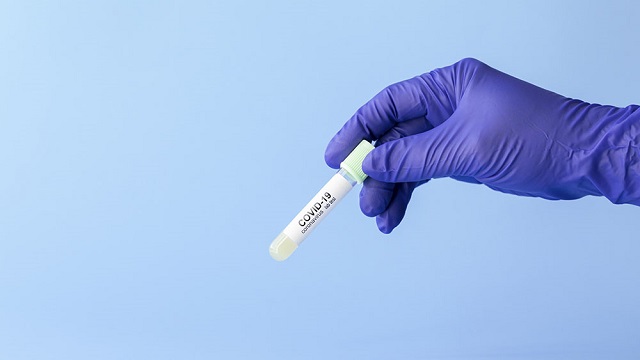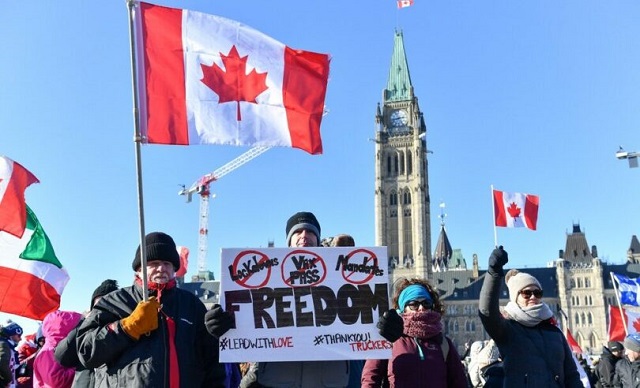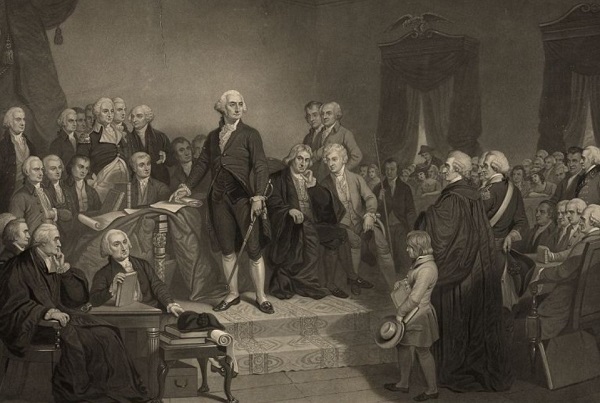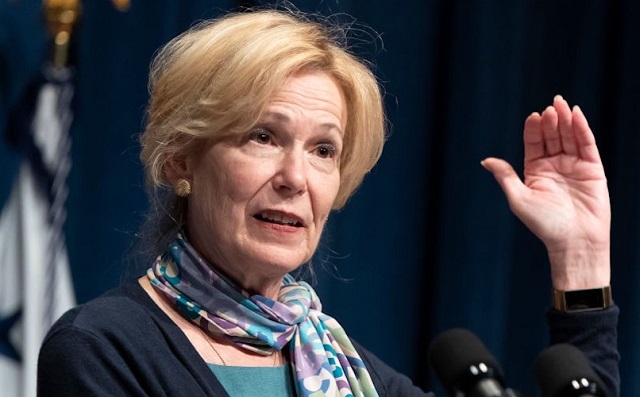COVID-19
Pfizer documents challenge Health Canada COVID-19 vaccine narrative

From the Frontier Centre for Public Policy
By Ray McGinnis
Dr. Theresa Tam and senior federal health officials walked onto a stage this fall, socially distanced. Each wore masks, addressing an empty room.
Have they been living in a bubble?
The New York Times reported on February 21, 2023, that wearing masks did nothing to protect people from the COVID-19 virus.
Reporting on a rigorous and extensive study, Oxford epidemiologist Tom Jefferson said, “There is just no evidence that they [masks] make any difference. Full stop.” Jefferson said that even if one were to don an N-95 mask that it “makes no difference – none of it.” The microscopic hole in an N-95 mask was 35 microns. The much smaller droplet from the C-19 virus was 0.15 microns and could easily float through the N-19 mask hole. And why would a mask only be needed to protect us in public when we are not eating or drinking?
Health Canada continues to encourage the public to get COVID-19 boosters this fall. The agency asserts: “It’s considered safe to get both your COVID booster and a flu shot at the same appointment.” They are also “reviewing updated booster shots for children six months and up.”
However, release of the Pfizer Documents reveals people would be wise to avoid getting anymore boosters.
During its brief clinical trials, and in the first 12 weeks of the mRNA vaccine rollout, Pfizer compiled over 55,000 documents that related to clinical trials and other research the company conducted. The company hoped these documents would be sealed from public view for 75 years. The U.S. Food and Drug Administration supported keeping the data secret.
Nevertheless, a US court disagreed. The documents began being released in 2022. Steve K. Bannon hosted whistleblower Dr. Naomi Wolf on his War Room podcast. Together, they issued a call for medical and scientific experts to examine the documents. Project manager, Amy Kelly divided 3,500 highly trained specialists into teams. And they went through the material with a fine-toothed comb Their findings are published in the War Room/DailyClout Pfizer Documents Analysis Reports.
The teams learned that Pfizer had many reports of serious adverse events after the initial 12-week rollout – 158,000 – that they had to hire an additional 2,400 full-time staff to manage the caseload.
A Pfizer Safety Branch Report concluded that by February 28, 2021, 1,223 people had died because of the vaccine.
Pfizer did not disclose all of its vaccine ingredients. In fact, a news story reports: “Health Canada Confirms Undisclosed Presence of DNA Sequence in Pfizer Shot.” The Epoch Times explains that the Simian Virus 40 DNA sequence is in some of the the Pfizer mRNA vaccine, citing scientists who warn that it can be carcinogenic.
It seems that Pfizer kept sloppy records of the clinical trials. Pfizer Documents Investigation Team 5 reported: “a great deal of data… [is] missing from Pfizer’s analysis of adverse events that were reported after the Pfizer mRNA vaccine was approved by the US Food and Drug Administration…. The outcomes of almost one-quarter (22%) are not known.” They added, “Pfizer’s 3.7% fatality rate for the adverse event cases with known outcomes doesn’t include patients that Pfizer said had not recovered at the time of the report (30 April 2021).”
Team 1 reported that from December 1, 2020, “Pfizer was aware that the vaccine…had limited efficacy.” They reported that:“1,625 serious cases of vaccine ineffectiveness….” This included 136 people dying of COVID-19 related pneumonia after getting the Pfizer shot.
Team 3 examined what Pfizer did to ensure the safety of their vaccine. Did the vaccine stay in the arm, or did it travel to other places?
It was known that the engineered nanomaterials in the vaccine can cross or bypass the blood-brain barrier. What were the implications for the central nervous system? Team 3 discovered that: “This evaluation was never done in the Pfizer safety and efficacy trials… it is impossible to know whether the vaccine is safe in this arena. Pfizer did not prove the safety of the nano-lipid delivery system for the brain:” They just didn’t look under that rock.
In March 2022, the Journal of Pediatrics reported that the Seattle Children’s Hospital at the University of Washington had 35 cases of myocarditis in children within one week of receiving the second dose of the Pfizer vaccine. Team 1 reported that it was clear to both Pfizer and the FDA that by June 2021 there was a “serious problem of myocarditis in adolescents following mRNA vaccination….” Nonetheless, the FDA went ahead and issued the Emergency Use Authorization to include teenagers, and they did not mention the risks.
The Pfizer Documents also reveal that by February 28, 2021, they knew that serious stroke adverse events were occurring after vaccination. Pfizer observed 275 patients who had a stroke post-vaccine….“Strokes are life-altering events. Even Pfizer categorized all the reported stroke as serious.” Nonetheless, even after Pfizer examined the stroke adverse events, they offered an upbeat assessment: “This cumulative case review does not raise new safety issues.”
And what did Health Canada say?
Journalist Rodney Palmer reported to the National Citizens Inquiry that the Government of Canada reported that by “March 3, 2023, [there were] a total of 427 reports with an outcome of death…reported following vaccination.”
Unfortunately, Canadians are still living in a bubble with little understanding of the adverse effects of the COVID-19 vaccines and boosters.
Ray McGinnis is a senior fellow at the Frontier Centre for Public Policy, and author of Unanswered Questions and Writing the Sacred.
COVID-19
Trudeau government only sought legal advice after Emergencies Act was invoked, records indicate

Canada’s Freedom Convoy in Ottawa Minas Panagiotakis/Getty Images
From LifeSiteNews
The two-page Memorandum For The Attorney General was dated February 15, 2022, and was written by the deputy director of prosecutions. The date of the memorandum is significant, as it comes after Trudeau had invoked the EA on February 14.
A Conservative MP’s request for information has revealed that the cabinet of Prime Minister Justin Trudeau waited until after it had invoked the Emergencies Act (EA), which was done to take down the peaceful Freedom Convoy, to get legal advice from Canada’s Attorney General on whether its use was lawful.
As noted in a recent Blacklocks’s Reporter article, Access To Information records obtained by Conservative MP Arnold Viersen from the office of the Attorney General confirm what many MPs have been suspicious of for years, that Trudeau’s use of the EA was not really warranted.
“I filed an Access To Information request for the memorandum on the Emergencies Act sent to the Attorney General from the Public Prosecution Service,” MP Viersen said in a statement to the media.
“What did they advise the Attorney General? We will never know because Justin Trudeau censored it.”
The documents, despite being censored, do reveal that the two-page Memorandum For The Attorney General was dated February 15, 2022, and was written by the deputy director of prosecutions. The date of the memorandum is significant, as it comes after Trudeau had invoked the EA on February 14.
Trudeau’s Attorney General Arif Virani, during testimony on February 28, said that there was a legal opinion offered regarding whether the use of the EA would be justified, but that its contents had to remain confidential.
This claim of secret legal advice has never been substantiated.
In early 2022, the Freedom Convoy saw thousands of Canadians from coast to coast come to Ottawa to demand an end to COVID mandates in all forms. Despite the peaceful nature of the protest, Trudeau’s government enacted the EA on February 14, 2022. Trudeau revoked the EA on February 23.
Earlier this year, Canada’s Federal Court announced that the use of the EA by the Trudeau government was a direct violation of the nation’s Charter of Rights and Freedoms, and thus was “not justified.”
Of note is that the judge who ruled Trudeau’s government’s use of the EA was “not justified” was Federal Court Justice Richard Mosley, a Liberal-appointed and well-respected judge with decades of experience.
The Trudeau government has since appealed the court’s decision.
I do not ‘believe for a second’ the ‘threshold’ was met to invoke EA
Conservative MP Glen Motz told a February 28 hearing of the Special Joint Committee on the Declaration of Emergency that he did not believe for a “second” that the “broader interpretation even existed,” in terms of the legality of the EA’s use.
“I still believe more strongly today than I did in 2022 that the circumstances to invoke the Emergencies Act were not met,” he said, noting that “The threshold was not met.”
“I agree with Justice Mosley in his decision that it was in fact illegal and unconstitutional,” he said.
The EA controversially allowed the government to freeze the bank accounts of protesters, conscript tow truck drivers, and arrest people for participating in assemblies the government deemed illegal.
Before Mosley’s ruling, an investigation into the use of the EA, as per Canadian law, was launched by Trudeau. The investigation, titled the Public Order Emergency Commission, was headed by Liberal-leaning Judge Paul Rouleau. Unsurprisingly, the commission exonerated Trudeau’s use of the EA.
During the clear-out of protesters after the EA was put in place, one protester, an elderly lady, was trampled by a police horse, and one conservative female reporter was beaten by police and shot with a tear gas canister.
Last month, LifeSiteNews reported that Conservative MP Marilyn Gladu uncovered that the federal government of Trudeau spent $2.2 million in taxpayer money in a failed attempt to try and stop court challenges filed against it for enacting the EA to stop the peaceful Freedom Convoy.
Freedom Convoy leaders Tamara Lich and Chris Barber have been in a ongoing legal battle with federal officials.
COVID-19
More victories for freedom as ArriveCAN charges dropped and fines reduced

Gheorghe and Carmen Neferu
News release from The Justice Centre for Constitutional Freedoms
The Justice Centre for Constitutional Freedoms is pleased to announce that it continues to see dropped charges and significantly reduced fines for Canadians who allegedly violated the Quarantine Act or who chose not to use the ArriveCAN app at Canadian borders.
The Justice Centre has provided defence counsel to eight Canadians who chose not to comply with a mandatory ArriveCAN.
Added together, these eight Canadians received a total of 13 tickets, with combined fine amounts totalling $54,815. Defence counsel provided by the Justice Centre negotiated with the Crown to secure admissions that amounted to fines totalling $1,216, not $54,815. All hearings for these cases were scheduled to take place in April at the Ontario Court of Justice in Mississauga, Ontario.
Here are their stories.
Cory Thorn, along with his wife, Guiseppina Lamacchia, their two small children and Guiseppina’s mother Carmela Lamacchia, were returning from a trip to Italy on September 8, 2022, when they were stopped at the Canadian border. They had not downloaded the ArriveCAN app because they did not feel comfortable with the app. They asked if they could submit the required information on paper but were told they could either use the app or face fines. The three adults were given two tickets each, one for $955 and another for $6,255. Together, the family faced a total of $21,630 in fines for violating two sections of the Quarantine Act: section 58, failing to comply with an order prohibiting or subjecting to any condition the entry into Canada and section 15(1), failing to answer a relevant question asked by a screening officer or to provide the officer with any required information or record. Their trials were scheduled for April 15, 2024. Five of the six tickets were dismissed. Carmela pled guilty to one charge and received a reduced fine of $615.
On September 22, 2022, a mother and her adult daughter, who have requested anonymity, were returning from a trip to Italy when they were each fined $6,255 for failing to use the ArriveCAN app. The women felt uneasy providing private health information through the ArriveCAN app. They offered to provide the information orally to border officials. Their offer was refused. Each had trial dates set for April 23, 2024. The daughter’s charge was withdrawn by the Crown, while her mother pled guilty and paid a significantly reduced fine of $300.
Daniel Sauro and his partner, Gina Campoli, traveling with their one-year-old daughter, returned from a family vacation on September 24, 2022, when each adult was issued a ticket for $6,255 under section 58 of the Quarantine Act for not using the ArriveCAN app. They were uneasy about disclosing private medical information and were concerned about the app’s security. Their trial was scheduled for April 18, 2024 -nineteen months after the tickets were issued. The public health officer did not appear at trial, and so the prosecutor was forced to withdraw all charges.
Gheorghe and Carmen Neferu traveled back to Canada from abroad on August 3, 2022, when they were each given two tickets with fines for failing to use the ArriveCAN app, totaling $14,420 They did not want to answer invasive questions regarding their medical status. Their trials were scheduled for April 8, 2024. The charges against Carmen were withdrawn, while Gheorghe had one charge withdrawn. He pled guilty to the other, paying a reduced fine of $300.
A constitutional challenge to the ArriveCAN app requirement continues to proceed in the Ontario Court of Justice.
Chris Fleury, lead counsel on the Charter challenge to the ArriveCan app requirement, says, “Each and every Canadian who refused to provide their vaccination status via ArriveCAN was also subject to a mandatory 14-day quarantine in addition to their ticket. The quarantine had no scientific or public health basis and was a breach of Canadian’s Charter right not to be arbitrarily detained. While we would have preferred that no one was charged in the first place, we are pleased to see the prosecution taking a more reasonable approach to these cases.”
-

 Brownstone Institute2 days ago
Brownstone Institute2 days agoMedical Elites’ Disgrace Over Ivermectin
-

 COVID-191 day ago
COVID-191 day agoThe New York Times Admits Injuries from COVID-19 Shots
-

 Opinion2 days ago
Opinion2 days agoThe American Experiment Has Gone Down In Flames
-

 National19 hours ago
National19 hours agoDespite claims of 215 ‘unmarked graves,’ no bodies have been found at Canadian residential school
-

 Brownstone Institute11 hours ago
Brownstone Institute11 hours agoThe WHO’s Proposed Pandemic Agreements Worsen Public Health
-

 Energy1 day ago
Energy1 day agoBuckle Up for Summer Blackouts: Wind Is Already Failing Texas in Spring
-

 Energy1 day ago
Energy1 day agoFederal government continues to reject golden opportunities to export LNG
-

 COVID-191 day ago
COVID-191 day agoFormer COVID coordinator Deborah Birx now admits jabs could have injured ‘thousands’





